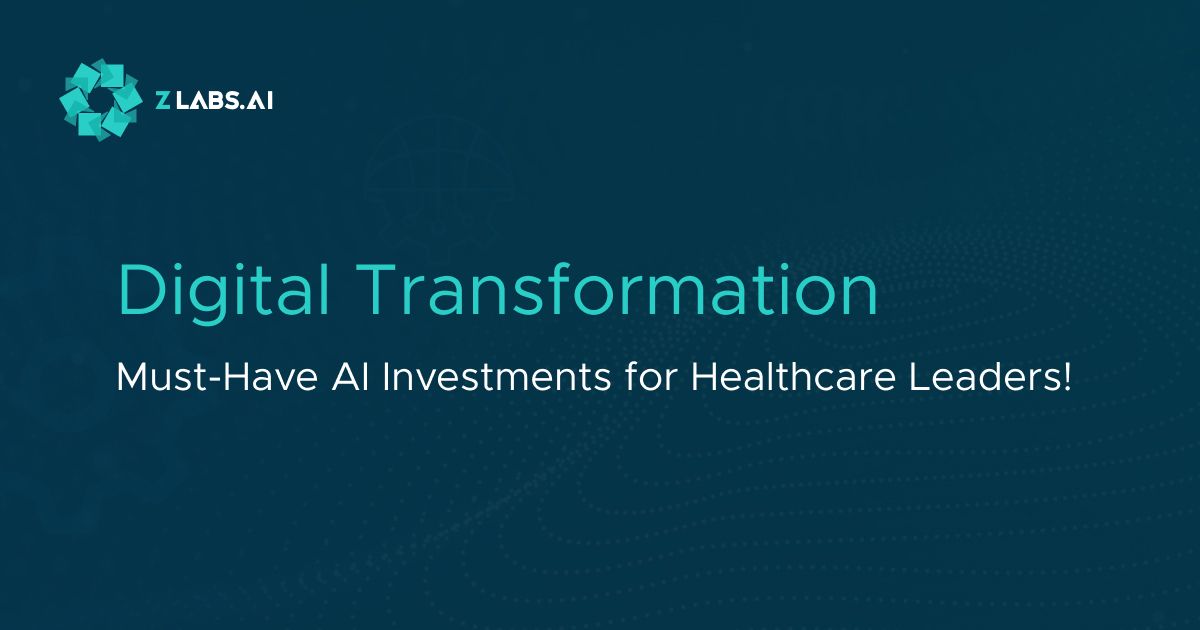Essential AI Investments for Healthcare's Digital Transformatio
The healthcare landscape is undergoing a profound transformation, driven by advancements in digital technology. At the forefront of this revolution is artificial intelligence (AI), which promises to address critical challenges, streamline operations, and improve patient outcomes. For healthcare leaders, strategic investments in AI can offer a competitive edge and ensure their organizations are prepared for the future.

AI-Driven Virtual Health Assistants: Enhancing Patient Engagement and Reducing Staff Workload
One of the most impactful AI applications in healthcare is the use of AI-driven virtual health assistants. These tools provide 24/7 support, answering routine inquiries, scheduling appointments, and offering personalized medical advice based on patient data. According to a McKinsey report, such technologies can reduce the burden on healthcare staff, allowing them to focus on more complex tasks, thereby improving operational efficiency and patient engagement.
Precision Medicine with AI and Big Data: Customizing Treatments for Complex Diseases
Precision medicine leverages AI and big data to tailor treatments to individual patients’ genetic, environmental, and lifestyle factors. This approach is particularly effective for complex diseases such as cancer and rare genetic disorders. A study by Deloitte highlights that AI can analyze vast datasets to identify the most effective treatment protocols, leading to better patient outcomes and reduced adverse effects. This shift from a one-size-fits-all model to personalized care is a game-changer in modern healthcare.
AI-Powered Mental Health Solutions: Addressing the Growing Mental Health Crisis
Mental health issues are on the rise globally, with traditional healthcare systems struggling to meet the demand. AI-powered mental health solutions, such as chatbots and predictive analytics, can provide early intervention and continuous support. Forbes reports that these tools can enhance access to mental health services, offering timely interventions and reducing the burden on healthcare providers. By investing in AI, healthcare leaders can better manage the growing demand for mental health support.
AI in Remote Patient Monitoring: Enhancing Chronic Disease Management
Remote patient monitoring (RPM) technologies use AI to track health metrics like blood pressure, glucose levels, and heart rate in real-time. The World Economic Forum (WEF) emphasizes that AI algorithms can provide actionable insights, enabling timely interventions and improving chronic disease management. By reducing hospital admissions and enhancing patient quality of life, AI-driven RPM can significantly impact healthcare delivery.
AI-Enhanced Surgical Planning: Reducing Complications and Improving Outcomes
Surgical planning is another area where AI is making significant strides. Advanced imaging and predictive analytics assist surgeons in preoperative planning, simulating different scenarios and predicting potential complications. Research from Harvard Business Review (HBR) indicates that AI-enhanced surgical planning can standardize procedures, reduce complications, and improve overall patient outcomes. This technology not only increases the precision of surgical interventions but also boosts patient safety.
AI-Driven Drug Repurposing: Accelerating the Discovery of New Treatments
The process of drug development is traditionally slow and expensive. AI-driven drug repurposing accelerates this process by analyzing extensive datasets to find new therapeutic uses for existing drugs. McKinsey highlights that this approach can significantly reduce development costs and bring effective treatments to market faster. For healthcare leaders, investing in AI for drug repurposing offers a strategic advantage in addressing unmet medical needs.
AI-Powered Infection Control: Preventing Healthcare-Associated Infections
Healthcare-associated infections (HAIs) are a persistent challenge for healthcare facilities. AI-powered infection control systems utilize real-time data from electronic health records (EHRs), surveillance systems, and environmental sensors to identify infection risks and implement preventive measures. Deloitte reports that these systems can reduce the incidence of HAIs, enhancing patient safety and improving overall healthcare quality.
AI in Health Equity: Addressing Disparities in Healthcare Access and Outcomes
AI has the potential to address health disparities by identifying at-risk populations and tailoring interventions to specific community needs. By analyzing social determinants of health, AI can help develop targeted programs that improve health equity. According to the WEF, utilizing AI to address health equity can improve access to care, reduce disparities, and ensure better health outcomes for all populations.

AI-Driven Clinical Trials Optimization: Enhancing Efficiency and Reducing Costs
Clinical trials are essential for developing new treatments, but they are often inefficient and costly. AI is transforming clinical trials by optimizing patient recruitment, predicting patient responses, and improving data analysis. HBR notes that AI-driven tools can make clinical trials more efficient and cost-effective, accelerating the development of new treatments and bringing them to market faster.

Conclusion
The integration of AI in healthcare offers unprecedented opportunities to address critical challenges and improve patient care. By investing in AI-driven virtual health assistants, precision medicine, mental health solutions, remote patient monitoring, surgical planning, drug repurposing, infection control, health equity, and clinical trials optimization, healthcare leaders can drive digital transformation, enhance operational efficiency, and deliver better health outcomes. Embrace these innovative AI solutions to lead your organization into a future of advanced, patient-centered healthcare.